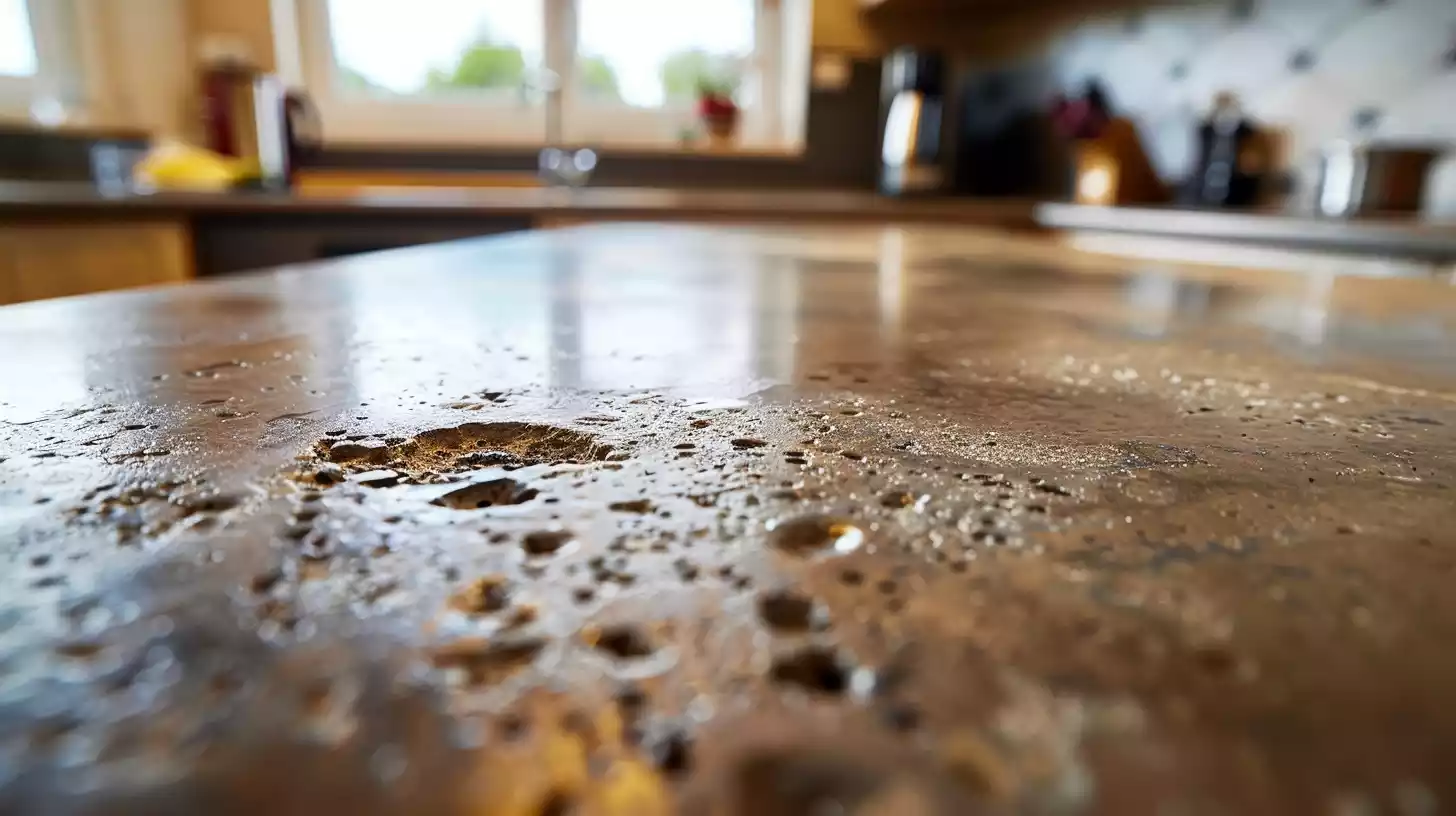Pitting problems in kitchen countertops can puzzle even the most meticulous homeowners. But why do these surfaces succumb to such imperfections?
The culprits behind these pits are more than meets the eye, with causes ranging from natural stone quirks to maintenance mishaps. Understanding these triggers is the first step in safeguarding your countertop investment.
Let’s look at the secrets behind countertop pitting and effective solutions to keep your kitchen surfaces pristine.
Continue Reading to Understand These Key Points:
- Acidic substances and direct heat cause countertop pitting.
- Neglecting maintenance accelerates deterioration.
- Harsh cleaners strip sealant, leading to vulnerability.
- Regular sealing and gentle cleaning prevent pitting.
Common Causes of Countertop Pitting
Experiencing kitchen countertop pitting can be frustrating and unsightly, often caused by various factors. The use of acidic substances such as citrus fruits or vinegar can eat away at the countertop surface, leading to small pits or holes over time.
Subjecting the countertop to high heat directly from hot pots and pans can cause thermal shock, contributing to pitting. Improperly sealed countertops are more prone to pitting as they can absorb water and chemicals that gradually degrade the surface.
The use of harsh cleaning chemicals or abrasive materials can accelerate the wear and tear on the countertop, resulting in pitting.
To prevent countertop pitting, it’s essential to avoid placing hot items directly on the surface, use cutting boards to protect against physical impact, seal the countertop properly to reduce water absorption and opt for gentle cleaning solutions instead of harsh chemicals.
Impact of Improper Maintenance
Improper maintenance, such as using harsh chemicals, can speed up kitchen countertop deterioration, leading to unsightly pits.
Neglecting regular sealing and cleaning can make granite countertops more prone to pitting, especially with water exposure and daily use.
Ignoring minor issues like scratches or small pits can worsen over time, creating larger, more noticeable imperfections.
To prevent such damage, adopt proper granite countertop maintenance practices like gentle cleaning, regular sealing, and avoiding harsh cleaners that strip away the protective seal.
Effects of Harsh Cleaning Products
Neglecting proper care for kitchen countertops can result in significant damage, especially when harsh cleaning products are used, leading to increased susceptibility to pitting over time.
Harsh cleaning products can strip away the protective sealant on countertops, leaving the surface vulnerable to pitting. Chemicals like bleach, ammonia, and vinegar are particularly damaging, causing gradual deterioration that manifests as pitting.
Abrasive cleaners containing harsh particles can scratch the countertop surface, creating small imperfections that are prone to developing into pits.
Continuous use of acidic cleaners further exacerbates the issue by etching the surface, making it more susceptible to pitting and losing its luster.
To prevent pitting caused by harsh cleaning products, it’s advisable to avoid using them altogether and opt for pH-neutral or mild soap cleaners instead. By choosing gentler cleaning solutions, you can maintain the integrity of your countertops and prolong their lifespan without the risk of pitting.
Understanding Natural Wear and Tear
Pitting on kitchen countertops is often a result of natural wear and tear from factors like physical impact, water exposure, and regular use. Granite countertops are particularly prone to developing pits due to their composition. These pits are a natural feature of granite and don’t necessarily indicate low quality.
Understanding the causes of pitting is essential for establishing proper maintenance routines. By being aware that daily kitchen activities can contribute to pitting, you can take steps to reduce its occurrence.
Regular cleaning, avoiding harsh chemicals, using cutting boards, and promptly cleaning spills can help preserve the quality and appearance of your granite countertops. Proper care can significantly extend the life and beauty of your kitchen surfaces.
Importance of Regular Sealing
Regular sealing is crucial in maintaining the quality of kitchen countertops. It helps prevent etching and staining, while also extending the lifespan of the countertop.
Without regular sealing, the countertop becomes vulnerable to damage and reduces its overall durability.
Sealing Prevents Etching
Properly sealing your granite countertop is crucial to protect it from etching caused by acidic substances. Sealing forms a barrier that prevents acids and chemicals from damaging the surface, preserving its smoothness and shine.
Without sealing, acidic liquids like lemon juice or vinegar can cause etching, harming the countertop.
Sealing also lowers the risk of pitting, ensuring your countertop stays in top condition despite daily use. It is recommended to professionally reseal every 1-3 years to boost protection against etching. The table below highlights the key benefits of regular sealing for granite countertops.
| Key Benefits of Sealing Granite Countertops |
|---|
| Prevents Etching caused by acids |
| Maintains Shine and Smoothness |
| Reduces Risk of Pitting and Damage |
| Enhances Longevity with Professional Resealing |
Enhances Countertop Longevity
To maintain your kitchen countertop’s longevity and durability, ensure a regular sealing schedule. Proper sealing of granite countertops protects their color, pattern, and lifespan.
Here are four reasons why sealing enhances countertop longevity:
- Prevents Moisture Penetration: Creates a barrier against moisture to avoid damage.
- Reduces Risk of Damage: Minimizes pitting, staining, and deterioration.
- Preserves Aesthetic Appeal: Prevents discoloration and etching for lasting beauty.
- Enhances Countertop Integrity: Safeguards against scratches and maintains overall integrity.
Effective Solutions for Countertop Pitting
I’ll start by discussing effective solutions for countertop pitting.
Repairing small pits promptly and preventing future damage through proper maintenance are crucial steps in preserving the integrity of the countertop surface.
Repairing Small Pits
Repair small pits in granite countertops effectively using a Granite & Marble Repair Kit. Follow these steps to guide you through the process:
- Clean the countertop surface thoroughly to remove any dirt or debris that could interfere with the repair.
- Mix the epoxy or resin adhesive according to the manufacturer’s instructions and apply it to the pits in the countertop.
- For a seamless finish, consider using clear acrylic gel fillers for smaller pits as they offer easier application and blend well with the granite.
- After the repair is complete, follow a routine of regular maintenance to prevent future pitting and maintain the countertop’s appearance.
Preventing Future Damage
Regularly sealing your countertop helps preserve its appearance and prevents future damage like pitting.
Natural countertops, such as granite or marble, are vulnerable to damage if not properly sealed. Sealing creates a protective barrier that prevents substances from penetrating the surface and causing pitting.
Use sealing products recommended for your countertop material and follow the manufacturer’s guidelines for application frequency. Avoid abrasive cleaners, minimize physical impact, and promptly clean spills to maintain your countertop’s longevity.
Final Thoughts
Maintaining the beauty of your kitchen countertops is crucial to prevent pitting issues. Remember, regular cleaning, proper care, and timely repairs will ensure your countertop remains pristine for years to come.
Don’t let neglect chip away at the elegance of your kitchen surfaces – stay proactive and keep them looking flawless with the right maintenance routine.


Loved the section about the importance of regular sealing! It’s something so many folks overlook, and then wonder why their countertops start showing wear and tear so quickly. I’ve always used a sealant every six months, and it’s made a huge difference. Does the type of sealant matter, or are all pretty much the same?
I’m curious about the technological aspects. Is there a smart device or maybe an app that can monitor the condition of countertops and alert you for maintenance? That’d be an innovative solution for preventing countertop pitting.
never knew harsh cleaning stuff could mess up countertops, will be careful now, thanks!
Absolutely, it’s all about the right products for the right materials. Keeping it simple does wonders!
While sealing is indeed crucial, I’ve come across some premium synthetic countertops that claim they do not require sealing at all. However, in my professional experience, even those benefit significantly from regular sealing to prevent staining and pitting over time. Would be interesting to get your take on this.
Oh great, another thing in the house I need to baby. Because having plants, pets, and kids wasn’t enough, let’s add the countertops to the mix. Why don’t they just make them indestructible already?